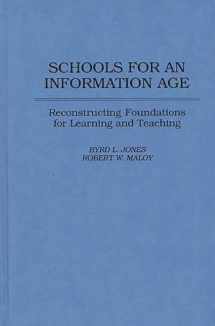
Schools for an Information Age: Reconstructing Foundations for Learning and Teaching
ISBN-13:
9780275953959
ISBN-10:
0275953955
Edition:
Illustrated
Author:
Robert W. Maloy, Byrd L. Jones
Publication date:
1996
Publisher:
Praeger
Format:
Hardcover
416 pages
Category:
Education Theory
,
Schools & Teaching
FREE US shipping
Book details
ISBN-13:
9780275953959
ISBN-10:
0275953955
Edition:
Illustrated
Author:
Robert W. Maloy, Byrd L. Jones
Publication date:
1996
Publisher:
Praeger
Format:
Hardcover
416 pages
Category:
Education Theory
,
Schools & Teaching
Summary
Schools for an Information Age: Reconstructing Foundations for Learning and Teaching (ISBN-13: 9780275953959 and ISBN-10: 0275953955), written by authors
Robert W. Maloy, Byrd L. Jones, was published by Praeger in 1996.
With an overall rating of 4.4 stars, it's a notable title among other
Education Theory
(Schools & Teaching) books. You can easily purchase or rent Schools for an Information Age: Reconstructing Foundations for Learning and Teaching (Hardcover) from BooksRun,
along with many other new and used
Education Theory
books
and textbooks.
And, if you're looking to sell your copy, our current buyback offer is $0.3.
Description
This provocative and accessible text is addressed to prospective and practicing teachers who believe schools must be fundamentally reformed to meet student needs in an information age. Drawing on interviews with frontline educators, the authors integrate descriptive accounts of learning and teaching in schools today with emerging multicultural curricula, information technologies, organizational structures that support innovations, and democratic dialogue. Jones and Maloy offer analytic perspectives for rethinking the social, historical, and philosophical foundations of education along with strategies for teacher renewal and organizational change.Adopting a constructivist-developmental approach to learning, the authors identify endemic dilemmas that increasingly handicap industrial-era schools. A stagnant economy heightens tensions due to class, race, and gender inequities. Hierarchically structured corporations and representative politics perpetuate business domination. Computers offer possibilities for more open communication, flexible organizations, and democratic discourse. Alternative visions of the future that engage students can renew cooperation, collaboration, and community in schools and society.


We would LOVE it if you could help us and other readers by reviewing the book
Book review

Congratulations! We have received your book review.
{user}
{createdAt}
by {truncated_author}


